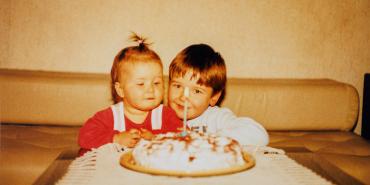Bullies: One Body, Two Persons

As ideal as it may seem, having a totally predictable life would be a real drag. Bring on a healthy dose of variety--even some serendipity (surprise discoveries)--to shake things up and keep us 'on our toes!'
But as we all know, unpredictability isn't always a 'slam dunk' panacea either. Not by a long shot. Unpredictability can take an especially high toll on relationships. When associates or intimates are undependable, inconsistent, untrustworthy, or downright flaky--our lives are severely disrupted. Their impulsive, off-the-wall antics keep us feeling confused, stressed, and even infuriated.
Game Plan Exposed
It's a fact that the bully is the king or queen of relationship unpredictability. This person's signature strategy consists of keeping others off balance, hence, under his or her control. Then the bully is free to manipulate--with purpose and skill--others to satisfy his or her sick, abhorrent needs.
The unpredictable nature of the bully makes it difficult for us to protect ourselves from the attacks, or devise effective counter-strategies. As a result, we feel like desperate, defenseless victims. Even if we could muster enough courage to pour out our heart to others, we're not sure we'll be believed. Thanks to the bully's cleverness, most folks are deceived.
But there is another cruel component to the bully game plan, frequently alluded to by psychologists. It involves eye-blink-quick, full-pendulum extremes--from angel to animal, charming to glib, hot to ice cold. One minute the bully is charming, convincing, and cuddly. The next minute he or she is vile, vicious, and vindictive! Same body. Same mouth. Two people!
This is known as the Jekyll-Hyde Syndrome, originating from a very old and well-known story. To grasp the context, let's pause to briefly examine a small slice of history.
Malicious Midnight Meanderer
The setting is Victorian England, 1886, when Scottish author, Robert Louis Stevenson, penned his ageless novel about a London lawyer who investigates strange occurrences between his old friend, Dr. Henry Jekyll, and the misanthropic Mr. Edward Hyde.
The respectable Dr. Jekyll, after drinking a potion of his own creation, is transformed into the cruel, remorseless, evil Edward Hyde-representing the hidden side of Jekyll's nature. As the novel progresses, Mr. Hyde becomes increasingly mysterious, violent, and secretive as his power grows. Eventually, he no longer needs to rely upon the potion to unleash his inner demon.
For nearly 150 years, the scary alter ego's nightly forays became fodder for the nightmares of readers (250,000 books sold by 1901) and theatergoers (over 123 film versions). As we might have expected, psychologists-especially Freudians-have had a field day speculating how this story defines the human condition.
Vividly, this fictitious work portrays trauma resulting from someone possessing a split personality, when a single person has within a deep, incessant, irresolvable inner conflict waged between good and evil, morality and sin.
Giving credence to the cynical myth that 'the good guy never wins,' this dramatic story portrays the evil Mr. Hyde emerging as the dominant personality.
When Bullies Embrace Mr. Hyde
In today's parlance the term serial seldom conjures positive thoughts. Look at serial rapists, murderers, shoplifters--but I've failed to hear of serial philanthropists, prayer warriors, or sacrificial servants. So, when we hear serial coupled with bullies we're on the right track to anticipate double trouble.
Serial bullies, estimated to be 1 in 30 people, are committed to a constant, consistent, and continuous bully lifestyle--in contrast to sporadic or 'sometimes' bullies. And here's a key point: serial bullies are those most likely to harbor split personalities. Again, the three telltale signs are:
- Totally 'off-the-wall' unpredictable
- Vacillate from being a mild-mannered, proper 'Dr. Jekyll' to a wild, malevolent 'Mr. Hyde' in nothing flat
- Deviously selective and inconsistent in choosing who and how to victimize
What seems to trigger the Jekyll-Hyde metamorphosis? The Mr. Hyde monster comes alive when he or she spots certain kinds of potential victims, those who seem to:
1. Manifest weak, unsuspecting and vulnerable characteristics (easy prey)--similar to an injured sea lion swimming near a hungry shark.
2. Figure out his game, and thus could 'blow the whistle' on his vile misdeeds, potentially causing a meltdown of his status and inflated self-esteem.
3. Gullibly conclude that he is trustworthy (a noble Dr. Jekyll), thanks to his convincing, manipulative smoothness.
4. Exhibit 'credibility-deficiency,' someone nobody would believe if they were to ever tell the truth about a bullying situation.
Many of us know plenty about Jekyll-Hyde serial bullies. Unfortunately, this is often from firsthand experience. Furthermore, we know we should prayerfully, carefully, and courageously intervene--directly 'speaking the truth in love' to the culprit, or delicately informing the 'right people.'
Silent Tongues
So why do we fail to do so? Why do we allow such personalities to continue as they do, without attempting to inform others? These seem to be the most prevalent reasons for our muteness:
1. We think it will 'blow-over-and-go away.' To paraphrase the sagacious King Solomon: Everything is but for a season. So this, too, is bound to eventually pass. Isn't it?
2. We fear that if we go over the bully's head, the person we tell may not keep it confidential (feeling that all people have the right to know their accuser), and retaliation would certainly follow.
3. We begin to think we could be alone in seeing (or thinking we see) the bully's vileness, since others don't seem disturbed. We conclude it must be our problem, and if so, we need to get over it.
4. We've heard about the evils of gossip, and as people of faith, we just don't feel right passing along negative reports to the bully's superior, pastor, or peer.
But we must get beyond these excuses and rationalizations, and dare to venture outside our comfort zones. The problem will probably not evaporate on its own, which means it can only intensify.
It is our Christian obligation to speak up.
The adage often attributed to Edmund Burke or Leo Tolstoy's novel War and Peace is right: The only thing necessary for evil to triumph is for good people to do nothing. And this 'evil' is not some abstract concept - it involves other hapless victims (including ourselves) being attacked. By vocalizing, when led by the Holy Spirit, we become a crucial part of the solution--that of raising awareness and even preventing the bullying from continuing.
Actually, we have no choice. Is it scary? No question. But God promises to walk with us. Paul declares: 'For God did not give us a spirit of timidity, but a spirit of power, of love and of self-discipline' (2 Timothy 1:7). He replaces our trepidation with boldness!
But let's pause to shine the spotlight on the Jekyll-Hyde Serial Bully himself. The person we'd never choose to be our boss nor ask to accompany us on our vacation. Is there hope for this intimidating, miserable, 'torn-apart-within' person--should that one ever desire to truly reform?
The short answer is 'absolutely.' But what pathway should they be advised to take?
Grasping on to Hope
Should Jekyll-Hyde serial bullies follow the example of certain celebrities and check into rehab for heavy-duty therapy? We shouldn't hold our breath. Few of these people end up doing so. A major chunk of their problem consists of not admitting their condition. They choose to remain in denial and take no steps toward rehabilitation.
With all due respect to beneficial therapeutic resources, the inspired Word of God is what must direct our attention. Plain and simple, it clearly exposes the root cause of all evil--including the serial bully--as none other than sin.
At the risk of sounding simplistic, when the serial bully submits to the Holy Spirit's intervention, he is no longer condemned by the law of sin (Romans 8:1-2), but is transformed (12:2) to emerge more than conqueror (8:37). Sin's domination is decisively abolished--not temporarily suppressed--not merely counteracted.
Serial bullies afflicted with Jekyll-Hyde Syndrome require a divine-human transplant! In holiness circles we refer to it as entire sanctification, a thorough cleansing of the heart and empowering for effective witness. It occurs instantaneously, subsequent to being born again (initial sanctification), but additionally begins a process of ever-deeper growth in Christian love.
It's ironic: Psychology proclaims that Mr. Hyde is the real person and Dr. Jekyll is merely an act. But the God of our Bible declares exactly the opposite, since He made us in His own image. This implies: Dr. Jekyll is, in fact, the real deal--and Mr. Hyde is nothing but an intrusive, unwelcome facsimile! But only if he relinquishes himself, hands-down, to the Spirit of God.
From Lion to Lamb
His name is Oscar Reed. He may have been the most gifted and humble professor I ever had. He was incredibly scholarly and firm in his convictions. But at the same time, he exhibited an extreme gentleness and compassion--even toward us students who relentlessly attempted to relax the standards.
I couldn't resist gravitating to his office on numerous occasions, just to soak in a bit of what he was all about. One day I asked him about his saintly temperament. He smiled and related a brief story.
He explained that during his college days he was a ruthless debater. Not content to simply triumph in competition, young Oscar went for his opponents' jugular. He wanted to reduce them to whimpering victims of his narcissistic rage. But at the same time, he was as smooth as silk around those he wished to impress. And either persona could be turned on or off like a faucet.
But his face became serious when he said: 'Then our Lord helped me to take full measure of what I had become.' He was, indeed, convicted in his heart and began ardently seeking an inner transformation.
Soon after that, he invited the Holy Spirit to dwell within. In an instant, he felt deeply purged of his sinful nature.
The war within ceased, as did his double-mindedness.
And from that moment, according to his sincere account, he had no desire to embarrass, pulverize, or diminish anyone--even in the heat of competition. In fact, his most basic nature did an about-face: He felt an inner compulsion to live holy and to help as many, in as many ways, as he possibly could.
I left his presence that day an inspired and greatly moved young student, and still recall our encounter as if it were yesterday. For the Mr. Hydes of the world, as well as their many victims, the message is clear: Indeed, change can occur because of the grace of our blessed Lord.
Jon Johnston is professor of sociology and anthropology at Pepperdine University and chair of the Association of Nazarene Sociologists and Researchers.
Kinds of Serial Bullies with Jekyll-Hyde Tendencies*
'All cruelty springs from weakness.'
(Seneca, Roman philosopher, 4 B.C.-A.D. 67)
1. Obsessively-compulsively need-driven: relentlessly pursues an idealized role
A. Attention Getter: addicted to the spotlight, microphone, or camera (control freak, manipulative, narcissistic)
B. Wannabe: craves affirmation, affiliation, and acceptance (deceptive, hallucinatory, ego-deprived)
C. Guru: proclaims self as expert or authority, and demands being perceived or treated as such (authoritarian, elitist, delusional)
2. Psychopath: manifests abnormal personality traits (e.g. lack of remorse) coupled with a marked tendency to become physically intimidating or violent (e.g. assault)
3. Sociopath ('socialized psychopath'): expresses lawful (but disapproved of and unappreciated) psychological abuse (e.g. hypercritical) [note:] tends to be person of higher socioeconomic status and intelligence than psychopath.
4. Antisocial Personality Disorder: engages in antisocial or unlawful actions| incorporates psychopathological and/or sociopathological personality traits.
*Extrapolated from material supplied by Robert Hare, international authority on psychopathology and author of Psychopathy Checklist Revised.
Survival Guide Tips: When Dr. Jekyll Turns Into Mr. Hyde
1. Resist confrontation when he's experiencing an 'episode.' Accentuate, magnify, soak in, and build on 'Dr. Jekyll' days.
2. Carefully record or document notes of:
a. Dr. Jekyll as well as Mr. Hyde incidents and patterns that occur.
b. Personal internal and external reactions.
3. Consult a professional coach or therapist, as well as literature.
4. Seek to bond with reliable, compassionate friends, and share with them in confidence.
5. Forgive as you gradually relinquish painful memories and disappointments to God.
6. Fervently persist in praying in faith, and tenaciously seeking guidance and comfort from God's Word and Spirit.
7. Paraphrasing Oswald Chambers, always remember that our Lord not only feels your distress, but has the power to abruptly intervene on your behalf-if and when He decides it's been enough!
Holiness Today, January/February 2010
Please note: This article was originally published in 2010. All facts, figures, and titles were accurate to the best of our knowledge at that time but may have since changed.




